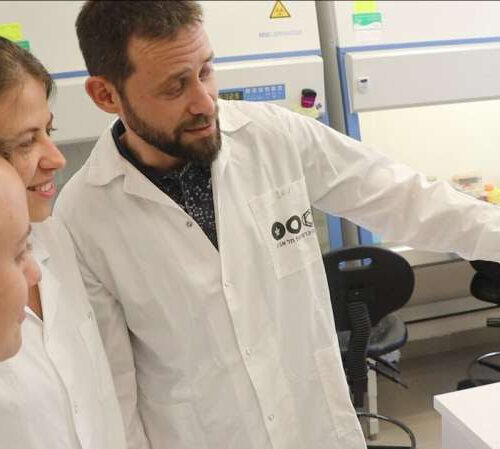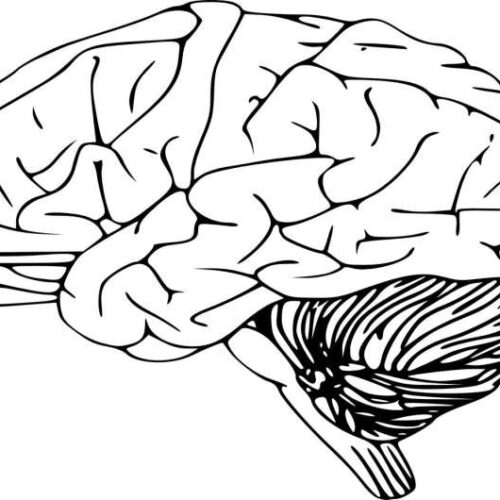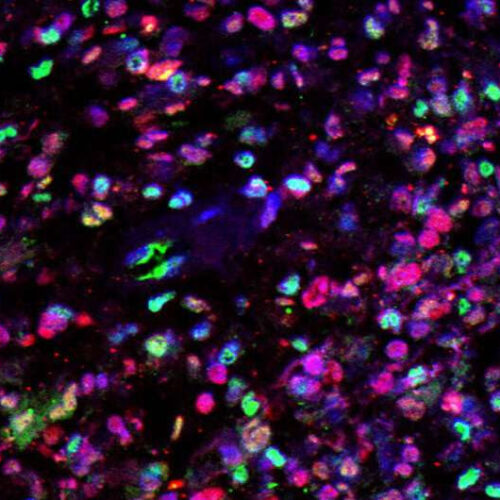Researchers have found a way to program immune cells to attack glioblastoma and treat the inflammation of multiple sclerosis in mice. The technology will soon be tested in a clinical trial for people with glioblastoma.Peer-Reviewed Publication University of California – San Francisco More information, including a copy of the paper, can be found online at...
Tag: <span>brain tumor</span>
Breakthrough Therapy Obliterates Deadly Brain Tumor in Days
ByMIKE MCRAE MRI scan of 72-year-old glioblastoma patient. (Choi et al., NEMJ, 2024)Brain scans of a 72-year-old man diagnosed with a highly aggressive form of cancer known as a glioblastoma have revealed a remarkable regression in his tumor’s size within days of receiving an infusion of an innovative new treatment. Though the outcomes of two...
Oral Drug for Brain Tumor Could Change Treatment Landscape
Neil Osterweil June 04, 2023 UPDATED June 9, 2023 // Editor’s note: This story has been updated with additional comments from Dr Rimas Vincas Lukas of Northwestern University. CHICAGO — Patients with a certain type of brain tumor could soon be treated with an oral targeted drug instead of undergoing more toxic chemotherapy and radiation, say researchers reporting new results...
Oral Drug for Brain Tumor Could Change Treatment Landscape
Neil Osterweil June 04, 2023 CHICAGO — Patients with a certain type of brain tumor could soon be treated with an oral targeted drug instead of undergoing more toxic chemotherapy and radiation, say researchers reporting new results that could potentially change the treatment landscape. The investigational drug vorasidenib (Servier) is awaiting approval for use in gliomas bearing...
Revolutionary Brain Tumor Treatment Discovered in Traditional Chinese Medicine
By BROWN UNIVERSITY APRIL 18, 2023 A new study has revealed the potential of a drug derived from indirubin, a natural compound used in traditional Chinese medicine, in treating malignant brain tumors in mice. Published in Cell Reports Medicine, the research highlights how a formulation of indirubin improved mice’s survival rates and moved the drug closer to clinical...
Brain tumor discovery paves way for new drug treatments
UNIVERSITY OF NOTTINGHAM New research has shown that the blood vessels that feed aggressive brain tumours have receptors that could allow a new type of drug-containing nanoparticle to be used to starve the tumours of the energy they use to grow and spread, and also cause other disruptions to their adapted existence, even killing themselves. Scientists from...
New method eradicates deadly brain tumors by ‘starving’ them of energy source
by Tel Aviv University Dr. Lior Mayo and students. Credit: Tel Aviv University A groundbreaking study at Tel Aviv University effectively eradicated glioblastoma, a highly lethal type of brain cancer. The researchers achieved the outcome using a method they developed based on their discovery of two critical mechanisms in the brain that support tumor growth and...
Widely-used hormone drug associated with increased risk of benign brain tumor at high doses
by University of Bristol Credit: Pixabay/CC0 Public Domain High doses of a widely-used drug used in the hormonal treatment of conditions such as excessive hair growth, early puberty, prostate cancer, are linked to an increased risk of meningioma—the most common type of benign brain tumor, finds a University of Bristol-led study of over 8-million patients. The...
Research breakthrough could mean better treatment for patients with most deadly form of brain tumor
by Queen Mary, University of London Glioblastoma under microscope with dyes. Credit: Brain Tumour Research Centre of Excellence at Queen Mary University of London. Scientists studying the most common and aggressive type of brain tumor in adults have discovered a new way of analyzing diseased and healthy cells from the same patient. Crucially, the work which...
Common diabetes drug shows promise against rare childhood brain tumor in laboratory studies
by University of Michigan Credit: Unsplash/CC0 Public Domain Metformin, a drug commonly prescribed against diabetes, holds promise against a rare type of childhood brain tumor in laboratory studies, an international team of researchers led by the University of Michigan Health Rogel Cancer Center report in Science Translational Medicine. Experiments that uncovered new understandings of group A posterior fossa ependymomas—or...
- 1
- 2





